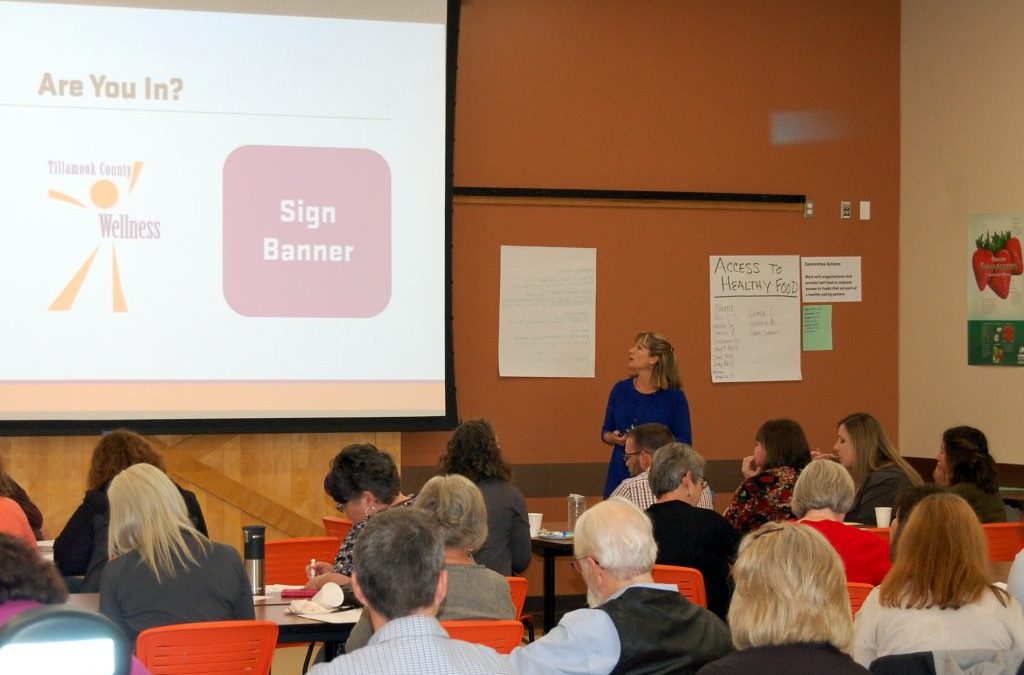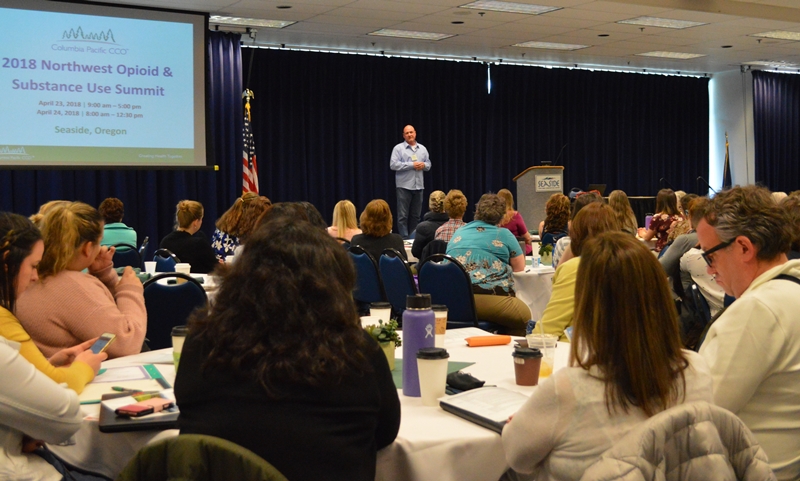
by Guest | Jun 22, 2018 | Being Well
Tillamook County Wellness continues it’s work because of the extraordinary level of engagement and collaboration among community partners and the community. The series “Why I’m In,” will feature what has inspired and motivated these efforts toward a common goal of improving community health. Michelle Jenck, health consultant, owner of Wholly Healthy LLC and the coordinator for Tillamook County Wellness under the Tillamook County Community Health Centers, kicks off the series.
“WHY I’M IN …” Michelle Jenck
What brought you/your organization into the Year of Wellness, now Tillamook County Wellness?
MICHELLE: For me, personally, I fell into this work by accident. Despite having severe asthma as a child, I began to exercise in high school and continued to expand my fitness practices through college and into my adult life. I found that I simply felt better, had better mental clarity and, well, honestly, my clothes just fit better when I worked out regularly. All that activity led me to develop a personal sense of awareness connecting how I moved with how I felt. Later, I began to do the same thing with my nutrition habits. A great deal of this motivation came from raising a child with special needs, observing how movement and nutrition played a role in his development and academic and social success. Anyone who knows me, knows I have been a passionate advocate for using movement and nutrition to help kids be more successful. That reputation led to me being “tapped” by Commissioner Baertlein for this work.
What changes have you seen as a result of YOW/Tillamook County Wellness?
MICHELLE: Since beginning as YOW/Tillamook County Wellness coordinator in 2015, I have had the pleasure of working with dozens of people who genuinely want to effect positive changes in their communities, workplaces, families and within themselves. There has been a shift in attitudes about our ability to improve population health. Ten years ago, I told a medical professional that I wanted to help children through improving P.E. and school nutrition. I was told, “Well, good luck beating your head against that brick wall.” In my experience, decision makers and citizens alike no longer view these kinds of changes as a pipe dream. They believe it is possible. And I think they believe that, in part, because of the work we are doing and because maintaining the status quo is no longer an option.
What have you learned from being involved in this work?
MICHELLE: I had a lot of assumptions about how things worked in terms of population health, and how I thought things should work. One thing I have learned is that there are more people working on societal challenges than most people are aware of. And, more importantly, these individuals and organizations do what they do because they want to be part of the solution. I have learned that there are barriers to be being fully effective and efficient in this work and many of these are outside of our control. Where we can make a difference, though, is in our own community, where we live and work and in our own family and personal life. We don’t always have to wait for a government policy to change or for special funding. We can figure out our own work arounds, our own funding sources and make it happen.
What are your hopes for this work as it relates to you/your organization?
MICHELLE: For me, my wildest hopes are being realized. We are achieving critical mass in working toward having collective impact. My only goal was to be an agent of change and I feel like I have been able to do that.
What are your hopes for this work as it relates to changing population health in Tillamook County?
MICHELLE: To demonstrate, at a grass-roots level, that measurable improvements to population health can be made and sustained. Specifically, though, my hope is that we raise children who know their worth and potential and who have the necessary skills to bring that to fruition. When people feel good and feel capable, they make better life choices and that translates to better health over their lifetime.

by Guest | May 11, 2018 | Being Well
YOW is evolving! Well into its third year, the “Year” of Wellness is transitioning into a long-term community health improvement initiative. “When people started referring to this as the ‘Century of Wellness,’ we knew it was time to make some changes,” Commissioner Bill Baertlein stated. Under his continued leadership, the Wellness Task Force is committed to continuing this effort under a more defined framework and a new title – “Tillamook County Wellness.”
To maximize and measure the impact of this work, the Wellness Task Force has chosen to focus on a key community health priority – reducing risk for Type 2 Diabetes. According to Marlene Putman, Public Health Administrator and Director of the Tillamook County Community Health Centers, “Nearly 12% of residents in Tillamook County have been diagnosed with Type 2 Diabetes and many more are not yet diagnosed or are at risk of developing the disease. Because risk factors for Type 2 Diabetes are similar to those for other health concerns, such as heart and lung disease, stroke and many cancers, lowering diabetes rates will positively impact many health conditions, saving healthcare dollars and improving quality of life for our residents.”
While nutrition, physical activity and avoiding tobacco use go a long way toward reducing these risks, there is more to the story. In addition to social-emotional factors, the environments where we live, work and recreate play a significant role in this complex puzzle. “By working strategically and collaboratively to influence these factors, we can support the development of healthy community norms and values, and thus have a much greater impact on health outcomes at a population level,” said Michelle Jenck, Tillamook County Wellness Coordinator.
To accomplish the goal of reducing risk for Type 2 Diabetes, Tillamook County Wellness is hosting a Kick Off event, Monday, May 14th from 10:00 a.m. – 12:00 noon at the OSU Extension/Partners for Rural Innovation Building, located at 4506 Third street near the Fairgrounds. At this event, new committees will be forming around the following strategic areas:
- Health Promotion
- Health Screenings
- Workplace Wellness
- Access to Healthy Food
- Access to Physical Activity
This interactive event is designed to engage passionate wellness advocates in changing their community from the ground up. Plan to attend if you would like to learn more or are interested in joining a committee. For more information and to RSVP your attendance, contact Michelle Jenck at (503)812-8354 or info@whollyhealthyllc.com.

by Guest | May 4, 2018 | Being Well
Heather White, Community Health Improvement Coordinator, Columbia-Pacific CCO
One of my favorite annual events since coming to work at Columbia Pacific CCO is the Northwest Opioid & Substance Use Summit which took place this year on April 23rd and 24th in Seaside. People from across disciplines and perspectives come together at this summit to learn from each other and have conversations about what we’re all doing around topics such as opioid prescribing, substance use disorders, chronic pain, and community prevention and intervention.
This year, a key thread from each of these conversations was “trauma-informed care.” Each presentation was unique and yet equally powerful, and each represented a different piece of the puzzle addressing these tough topics in our rural, coastal communities. For example:
- Alan Evans, CEO of Helping Hands, shared his own journey from trauma and addiction to his current mission of housing and re-entry without judgment
- Ari Wagner, MS, from Greater Oregon Behavioral Healthcare, Inc., showcased how trauma-informed clinics, communities, and law enforcement can positively impact the substance use disorder epidemic
- Emily Fanjoy and Valerie Bundy, LPC, NCC, from the Tillamook County Women’s Resource Center presented on the intersections of intimate partner violence, chronic pain, and substance use disorders
- Representatives of the PowerCLEAN program in Columbia County shared how their partnership with Columbia Pacific CCO to provide holistic fitness, nutrition, and support has helped people stay in recovery
- Mike McNickle, MPH, MPA, REHS, Director of Clatsop County Public Health shared how they have partnered with Jordan’s Hope for Recovery to start a successful and safe needle exchange program
- Ron Jackson, MSW, LICSW, from University of Washington highlighted why Medication-Assisted Treatment (MAT) is so important to increasing success in recovery
- Denise Weiss, RN, Jeff Luty, MD, and Terra Marzano, LCSW, shared their team-based approach to MAT care at the Rinehart Clinic
- DeAnna Pearl, MAT, BS, CPS, spoke about the importance of building resilience early in childhood to reduce the risk of substance use disorders and other chronic health issues
Each presentation highlighted the hope we all share. Each person’s work and passion make a difference in our communities. Tillamook County is currently experiencing the fastest increase in the rate of per-capita prescription opioid overdose deaths and has the highest level of high-dose opioid prescribing in the state. The statistics can be disheartening but great work is being done.
According to summit attendee, Eric Swanson, Executive Director of Strategy & Business Development with Tillamook Regional Medical Center, “Opioid use/abuse is often measured in terms of the deaths that result – a very sobering statistic. However, we often forget about the other societal impacts of addiction that are much more difficult of measure, i.e., broken homes, impact on children and other family members, loss of employment, as well as the costs to the criminal justice and health care systems. While these statistics are often much harder to quantify, the depth and breadth of this crisis is much greater than many of us care to consider. As we come together as a community in crisis, we must consider all the societal costs of this addiction and look for holistic strategies to impact all sides of this very complex disease.”
But what can I do?
We can all play a part! Here are some important things anyone could start doing today.
- Be a safe, loving adult in the lives of children around you. Research shows, again and again, that when kids have trustworthy and caring adults in their lives, who listen to them and model healthy ways to cope with stress, their risk of all sorts of chronic conditions (including chronic pain and substance use disorders) decreases greatly. If we ask ourselves “what happened to you” instead of “what’s wrong with you,” that will go a long way toward creating lasting change in our communities.
- Store and dispose of your medications safely. Lock your medicine cabinets. Monitor how quickly you run out of your medications. And when you’re done with them or when they expire, take them to a safe disposal site. This keeps prescription medicine out of the wrong hands and out of our water system. If you missed the drug takeback event on Saturday, there are year-round medication drop boxes where you can dispose unused medicine. For more info, visit: https://www.oregonpainguidance.org/regions/north-coast/drug-take-back/
- If you or someone you know takes high doses of opioids, whether prescribed or illicit, consider carrying Naloxone. It is a life-saving drug that can reverse an overdose until paramedics arrive. In rural communities like ours, we don’t always have time to wait for help. Anyone can ask for a prescription for Naloxone at Safeway or Fred Meyer pharmacies. Prices may vary by health insurance. And our Good Samaritan Laws protect anyone calling 911 from being arrested for possession or use of illegal substances. For more info, visit: http://www.oregon.gov/oha/PH/PREVENTIONWELLNESS/SUBSTANCEUSE/OPIOIDS/Pages/naloxone.aspx#pharm

by Guest | Apr 27, 2018 | Being Well
Emily Fanjoy, TCWRC Health Programs Coordinator
Health care professionals and social service providers understand that a person’s overall health is impacted more by what happens outside of the doctor’s office than by what happens during an annual visit. As YOW, a public health-focused initiative, convenes community partnerships and collaborators to formulate a plan to address the high rates of diabetes in Tillamook County, we are looking at root causes for type II diabetes and barriers to medical care for people who are pre-diabetic. That means looking across a broad spectrum of potential causes. A person’s relationships, past and present, and the home they grew up in could be a contributing factor to developing diabetes and to successfully managing it.
Healthy relationships promote overall health and well-being, while unhealthy and abusive relationships contribute to poor health in a variety of ways. Unhealthy relationships can negatively impact a person’s immediate and long-term health. Unhealthy relationships where one person in the relationship uses a variety of methods to gain and maintain power and control over the other person are, unfortunately, common. According to surveys from the National Domestic Violence Hotline, approximately 1 in 4 women and 1 in 7 men have experienced intimate partner violence. It occurs across every demographic line of socioeconomic status, education level, sexual orientation, race, and religion. It can happen to anyone. Tactics include: jealousy, preventing their partner from spending time with friends and family; controlling how their partner spends money; and shaming or humiliating their partner in public or in private.
Many people assume that abusive relationships are defined by the presence of physical violence, but research shows that emotional and psychological abuse are used long before any physical violence occurs. Over time the control tactics cause chronic, toxic stress for the person subjected to them. In terms of health impacts, psychological abuse is as important an indicator for health outcomes as physical abuse. This means a person can experience negative health consequences as a result of an unhealthy relationship without ever being physically hurt by their partner.
Controlling, abusive behavior harms the partner who is subjected to it, and it can also harm the health and wellbeing of children growing up in homes where it’s the norm. The Adverse Childhood Experience Study, or ACEs, demonstrated the connection between growing up with violence in the home and experiencing long term chronic health conditions, including diabetes. Our bodies are wired to respond to real or perceived threats by releasing the hormone cortisol to fuel the “fight, flight, or freeze” response in dangerous situations. This is helpful for self protection in the short term but, if the body is constantly producing stress hormones, the effect can be damaging over time. Cortisol directly impacts blood sugar levels and heart rate, and is linked to the development of gastrointestinal conditions, heart disease, diabetes, and other illnesses.
As with childhood ACEs, even after an unhealthy relationship has ended, the experience of abuse can negatively impact health. Successfully managing mental or physical health conditions while in an unhealthy relationship can be challenging. If you or someone you know are concerned that your relationship is affecting your health, there is hope for healing. At TCWRC, we believe everyone deserves a healthy, supportive relationship.
TCWRC serves people of all genders with free, confidential advocacy services, community resource referrals, support groups, community and professional education and outreach, and counseling services. Our advocates and 24/7 helpline are available to anyone who wonders about their relationship and about what resources are available to them. We’re located at 1902 2nd St, Tillamook, OR 97141; 503-842-9486 or 1-800-992-1679. You are not alone.

by Guest | Apr 20, 2018 | Being Well
Jessica Linnell, PhD, Oregon State University Extension Service, Family & Community Health
When I first moved to Tillamook two years ago to join the Oregon State University Extension Service as a professor in Family & Community Health, I started hearing something repeatedly from everyone I met, “We have culture of working together,” and there were many examples.
One of these stories came from my neighbor who told me about the flood in 1996. While he shared with me the details of how devastating the flood was, his focus was not on what happened but rather on how people came together to help one other.
Since the very beginning of my time living in Tillamook County, I have understood that no matter how big or complex a problem is, the people of Tillamook County will work together. In addition to the crises like floods that bring us together, we have some big, complex health issues in Tillamook County that also require the spirit of collaboration.
If you look at the latest health assessments of our county, chronic diseases dominate the top of the list. One of these is the alarming rise in type 2 diabetes. Recent estimates show that nearly 11 percent of Tillamook County residents are diagnosed with diabetes, which is more than the state average. Additionally, up to 25% are estimated to have prediabetes. This is why type 2 diabetes was selected as the priority health issue for the next phase of the Year of Wellness.
Addressing type 2 diabetes is going to require we all work together to create communities that empower healthy lifestyles. That is why we have integrated a model called Collective Impact to support this work. The Collective Impact model encourages organizations to move from isolated work to working together collaboratively, by creating a common agenda and sharing resources, materials, time, risks, benefits and rewards.
When businesses, organizations, and community members come together around one problem, they maximize their expertise and resources to create solutions that are effective, tailored to the community, and can be sustained over time.
To help illustrate how collective impact can be a useful approach in efforts like the Year of Wellness, I would like to share this quote from Community Tool Box, a resource from the University of Kansas.
“Not all problems are created equal – some are simple, some are more complicated, and some are truly complex. Each type requires a somewhat different approach to solving them.
- An example of a simple problem is learning how to bake a cake – the right “recipe” is essential, but once you’ve discovered it, replication will get you almost the same result every time.
- An example of a complicated problem is sending a rocket to the moon – the right “protocols and formulas” are needed, as are high levels of expertise and training. Experience is built over time to get to the right result, which can then be repeated over time with the expectation of success.
- An example of a complex problem is raising a child – there are no “right” recipes or protocols that work in every situation. There are many outside factors that influence the situation, and every situation is unique. Experience helps, but in no way guarantees success.
A single service program may be quite appropriate to addressing problems that are simple or only somewhat complicated. Collective impact, however, is an approach to solving complex social problems.”
The myriad factors that influence our risk for type 2 diabetes are the reason type 2 diabetes is a big and complex health issue. Our risk is not just related to what we eat and how much we exercise. It is also influenced by factors like our family history, access to health services, and family and social norms. Additionally, our physical environment as well as organizational and government policies can have a big impact on our ability to engage in healthy lifestyles. By harnessing our collaborative spirit, we will be able to maximize our potential to have collective impact on type 2 diabetes.

by Guest | Apr 13, 2018 | Being Well
By Marlene Putman, Director, Tillamook County Community Health Centers and YOW Task Force Leadership Team Member
The Tillamook County Year of Wellness (YOW) has been a lot of things since it was formed in 2015. Whether you participated in the on-line wellness tracker, joined a partner organization for an event, tried new recipes, or just became more aware of your personal lifestyle habits, you have been a vital part of this grass-roots effort to make Tillamook County a healthier and happier place to live, work and play.
Appointed by the Board of County Commissioners, YOW’s 22-member Task Force continues to meet regularly. To build on the work to date and to have an even greater impact on our population’s health, this body decided to focus on one community health priority: Preventing Type 2 Diabetes.
Risk factors for Type 2 Diabetes are the same as for many other chronic diseases, such as heart and lung disease, stroke and many forms of cancer. Tobacco use, poor nutrition and inactivity are key lifestyle behaviors that increase risk for chronic illness. Environmental factors like stress, lack of social support and reduced access to health-promoting activities, nutrition and healthcare also contribute to one’s risk.
Because environment and lifestyle play such a significant role in chronic disease risk, the new YOW framework will be focused on shaping policies and access to make the healthful choices the easier choices. Examples of this could include building walking trails, changing cafeteria menus, and holding walking meetings in the workplace. Joining newly formed walking groups, or starting your own, is a great way to become more active and increase social ties. YOW partners offer many wellness events, activities and classes. Taking a cooking class or joining a diabetes prevention class is another great way you can get started making healthier changes right now.
A key goal is to assess, and restructure when feasible, the environments where people live, work and play to optimize healthful choices. To reach our goal of reducing the number of people at risk for Type 2 Diabetes, it is important that these habits are established early in life. For example, families can plan more meals and snacks at home with more fruits and vegetables. They can take advantage of youth programming after school and over the summer months to ensure their kids stay active and develop positive social and emotional skills.
YOW is about working together at every level of a community – between friends, family, and co-workers, between organizations, and with leadership at the local and state levels – to maximize community health while at the same time, reducing the cost burden of chronic disease.
It is important to note that YOW partners provide many services for people who have Type 2 Diabetes, Prediabetes and other chronic health conditions, such as heart disease. This good work will continue and will likely only be enhanced through the continued partnerships and networking that emerge from the new YOW framework. We continue to convene partners around key health promotion topics where resources can be shared and used for maximum community benefit.
Tillamook County is a special place where elected officials, healthcare leaders, businesses and non-profit directors work together. YOW is even more special in that passionate community volunteers can serve on committees and help shape which actions will best help us reach our goal of preventing Type 2 Diabetes. If you are interested in learning more, contact our coordinator, Michelle Jenck, at (503)812-8354.
We strive to ensure that Tillamook County residents have evidence-based, relevant health and wellness information at their fingertips. Visit tillamookcountyhealthmatters.org or download the Tillamook County YOW App for the latest blogs and recipes. View our calendar and classes pages to learn how you can get connected to wellness events in our community. And follow us on Facebook for news and updates on partner events, classes and walking group details.






